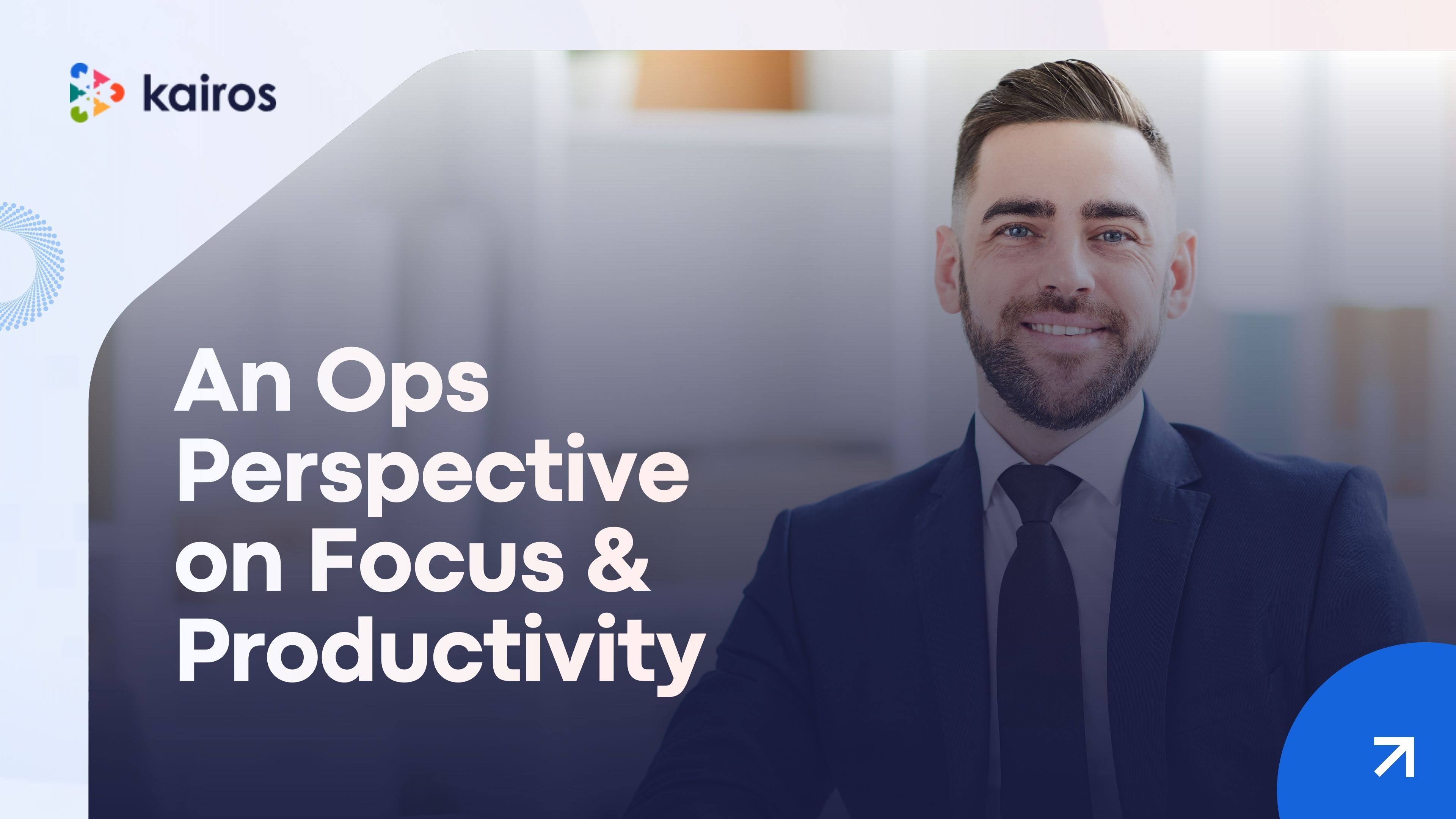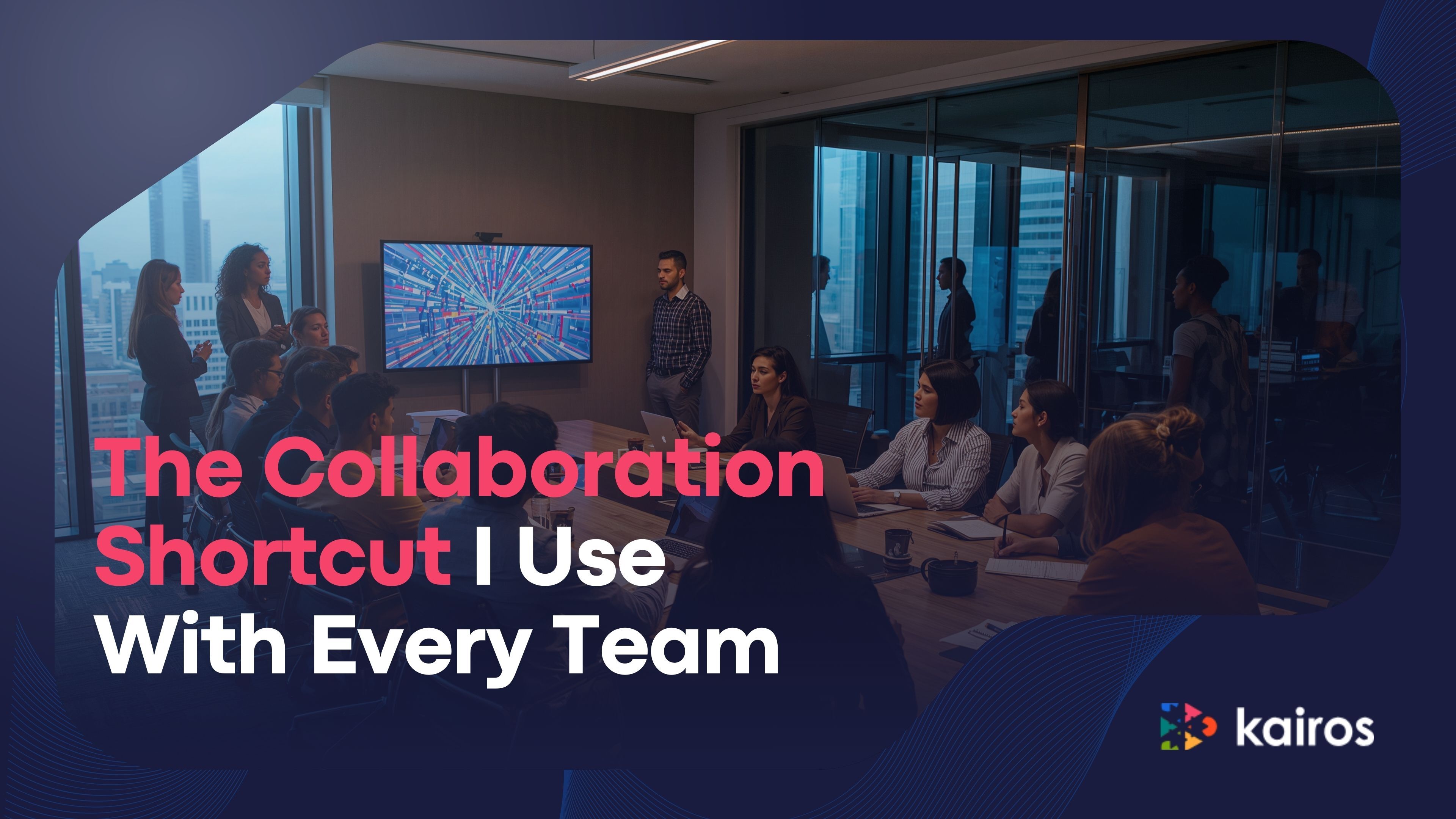How to Prioritize Company Initiatives
The key to effective prioritization lies in identifying and focusing on levers — initiatives that can be executed quickly and deliver exponential results.
However, to execute successfully, the following is often overlooked: Tackling your organization's meeting culture.
Today's business environment demands meetings to drive decision-making. Without efficient, outcome-oriented, and fast-paced meetings, your future projects are doomed.
Kairos is dedicated to transforming meeting cultures within organizations. By leveraging robust analytics and insights, Kairos provides critical data-driven feedback through post-meeting and meeting culture assessments. These assessments deliver essential insights into individual and organizational performance, enabling leadership to identify trends, measure performance, and make informed adjustments swiftly and effectively.
With Kairos, leaders can ensure that meetings are productive and aligned with strategic goals. The platform helps set clear objectives and milestones, fostering a culture of continuous improvement and agile execution. This not only enhances meeting efficiency but also drives successful transformations across the organization.
For leaders looking to prioritize initiatives effectively and drive meaningful change, Kairos offers the tools and insights necessary to achieve these goals. To learn more about how Kairos can help your organization, visit Kairos Beta Program and secure your spot in our exclusive beta program.
Leveraging Agile Methods for Exponential Results
The business world is moving faster than ever today; prioritizing company initiatives can make the difference between success and stagnation. The key to effective prioritization lies in identifying and focusing on levers—initiatives that can be executed in an agile manner to deliver exponential results through their ripple effects. One prime example of such a lever is transforming your organization's meeting culture. By establishing a culture of outcome-oriented, fast-paced meetings, you set the stage for all future initiatives to thrive.
The Importance of Meeting Culture
Meetings are the backbone of organizational communication and decision-making. Yet, many organizations suffer from unproductive meetings that drain time, energy, and resources. According to research by Dr. Steven Rogelberg, a leading expert in meeting science, effective meeting practices are often missing in many organizations, leading to a significant waste of resources. Kairos, a platform dedicated to improving meeting culture, offers a comprehensive solution that integrates training, assessments, and real-time prompts to transform how meetings are conducted.
Establishing Clear Objectives and Milestones
The foundation of any successful initiative lies in setting clear objectives and milestones. Without these, projects can easily go off track. Research shows that 37% of technology project failures are due to a lack of defined goals. By setting clear business and onboarding goals upfront and maintaining agility to adjust as needed, organizations can significantly increase their chances of success.
Importance of Clear Objectives and Milestones
Clear objectives and milestones provide a roadmap for the project team, ensuring that everyone is aligned and working towards the same goals. They offer a way to measure progress and success, making it easier to identify when a project is on track or needs adjustment.
Leveraging Kairos for Setting Objectives and Milestones
Kairos can be an invaluable tool in this process. With its robust analytics and insights, Kairos helps organizations set and track clear objectives and milestones. The platform provides post-meeting and meeting culture assessments, delivering critical insights into individual and organizational performance.
Example 1: Startup Looking to Scale
A SAAS startup wants to improve the efficiency of its operational planning meetings. By using Kairos, the agency can set specific objectives and milestones for this initiative:
Objective: Enhance operational planning efficiency by 30% within three months.
Milestones:
Month 1: Conduct an assessment using Kairos to identify current meeting inefficiencies.
Month 1-2: Implement Kairos' training program to up-skill meeting leaders and introduce new meeting principles.
Month 2: Use Kairos’ data-driven insights to adjust meeting structures and agendas.
Month 3: Monitor improvements and refine processes based on continuous feedback.
Kairos helps the companies maintain a clear focus on their objectives and provides the tools needed to measure and achieve these goals effectively.
Maintaining Agility in Objectives and Milestones
It's essential for organizations to maintain agility in their objectives and milestones. This means being prepared to adjust goals based on new information or changing circumstances. Kairos supports this agility by providing real-time data and insights, enabling organizations to pivot, when necessary, without losing sight of their overall objectives.
Embracing Agile Practices
Agile methodologies are not limited to team-level operations; they can be effectively applied to strategic planning and execution. Kairos enables organizations to break down strategic initiatives into manageable segments, allowing for rapid adjustments based on real-time feedback. This iterative approach fosters continuous improvement and learning, ensuring that strategies remain aligned with evolving business needs.
Data-Driven Decision Making

Making data-driven decisions is crucial for prioritizing initiatives effectively. Kairos provides robust analytics and insights through post-meeting and meeting culture assessments. These assessments deliver critical insights into individual and organizational performance, allowing leadership to identify trends, measure performance, and make informed adjustments swiftly and effectively. Here are two hypothetical examples illustrating how Kairos can transform decision-making processes in different industries.
Example 1: A Technology Company Enhancing Product Development Cycles
Scenario:
A technology company is facing challenges in its product development cycles due to inefficient meetings and poor cross-departmental communication. The company has decided to implement Kairos to gain better insights into their meeting practices and enhance their decision-making processes.
Implementation and Outcomes:
Assessment Phase:
The company conducts post-meeting assessments using Kairos to gather data on meeting duration, participant engagement, and decision outcomes.
Meeting culture assessments are used to identify patterns and behaviors that are hindering effective communication and collaboration.
Data Analysis:
Kairos' analytics reveal that product development meetings are often too long and lack a clear agenda, leading to wasted time and unclear action items.
The data shows a significant disparity in participation, with a few team members dominating discussions while others remain passive.
Informed Adjustments:
Based on these insights, the company restructures its meetings to include clear agendas and time limits. They also implement a rotating facilitator role to ensure balanced participation.
Regular feedback loops are established to monitor the effectiveness of these changes.
Results:
The company notices a 30% reduction in meeting times and a 20% increase in actionable outcomes from meetings.
Cross-departmental communication improves, leading to faster decision-making and a 15% reduction in the overall product development cycle time.
Example 2: A Healthcare Organization Improving Patient Care Coordination
Scenario:
A healthcare organization aims to improve patient care coordination by enhancing its internal meeting processes. They adopt Kairos to provide data-driven insights into their meeting practices and identify areas for improvement.
Implementation and Outcomes:
Assessment Phase:
The organization uses Kairos to conduct post-meeting assessments focused on care coordination meetings. They collect data on meeting frequency, duration, participant satisfaction, and patient care outcomes.
Meeting culture assessments help identify bottlenecks and inefficiencies in their current meeting practices.
Data Analysis:
Kairos' analytics indicate that meetings often run over time, leading to rushed decisions and incomplete action plans.
The data highlights a lack of follow-up on decisions made during meetings, resulting in inconsistent patient care coordination.
Informed Adjustments:
The organization introduces structured meeting agendas and sets clear objectives for each meeting.
They implement follow-up protocols to ensure that decisions made in meetings are tracked and executed effectively.
Results:
With clearer objectives and structured follow-up, the organization achieves a 25% improvement in meeting efficiency.
Patient care coordination becomes more consistent, leading to a 20% increase in patient satisfaction scores and a 10% reduction in readmission rates.
Leveraging Kairos for Data-Driven Success
Kairos provides the tools necessary to transform meeting practices through data-driven insights. By conducting thorough assessments and leveraging robust analytics, organizations can identify inefficiencies, implement informed adjustments, and achieve significant improvements in performance and outcomes. Whether it’s reducing product development cycles in a tech company or enhancing patient care coordination in a healthcare organization, Kairos equips leaders with the data they need to make effective, impactful decisions.
Promoting a Culture of Continuous Improvement
Kairos promotes a culture of continuous improvement by facilitating iterative progress. Through the Kairos Learning Lab, managers receive expert coaching and access to research-based video content developed by Dr. Rogelberg. This content helps elevate meeting leadership skills across the organization, ensuring that every phase of execution benefits from accumulated learnings and improvements.
Aligning Strategy with Execution
Kairos bridges the gap between strategic planning and execution. By aligning daily tasks with long-term goals, the platform helps organizations maintain focus and achieve strategic coherence. This alignment enhances execution efficiency and ensures that every effort contributes to the broader organizational vision.
Driving Innovation and Adaptability
In today's fast-paced business landscape, adaptability is crucial. Kairos empowers organizations to embrace innovation and respond to changes with agility. The platform supports a proactive approach to risk management, enabling teams to identify potential issues early and pivot strategies as needed. This adaptability ensures that organizations can navigate uncertainties and seize new opportunities.
Delivering Measurable Outcomes
Ultimately, the success of any strategic initiative is measured by its outcomes. Kairos is designed to deliver tangible, measurable results. By providing clear visibility into performance metrics and enabling data-driven adjustments, the platform ensures organizations achieve their desired outcomes efficiently and effectively.
Kairos is particularly beneficial for organizations that:
- Have a high volume of meetings and need to optimize time and improve outcomes.
- Experience meeting overload and struggle with unproductive and excessive meetings.
- Value continuous improvement and are committed to enhancing meeting culture and leadership skills.
- Use Microsoft Outlook (with GSuite integration coming soon).
- Large enterprises with complex structures, needing robust meeting management and data-driven insights.
- Innovative teams that prioritize creativity, collaboration, and innovation in meeting practices.
For more information, in the FREE Kairos BETA program – sign up HERE.


